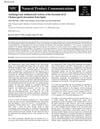 19 citations,
November 2017 in “Journal of Pharmaceutical Sciences”
19 citations,
November 2017 in “Journal of Pharmaceutical Sciences” A new gel containing minoxidil can treat hair loss effectively, potentially reducing side effects and improving treatment.
 12 citations,
March 2017 in “Medicinal Chemistry Research”
12 citations,
March 2017 in “Medicinal Chemistry Research” Some curcumin-like compounds can effectively and safely block the enzyme linked to hair loss and other conditions related to male hormones.
 9 citations,
October 2012 in “Natural Product Communications”
9 citations,
October 2012 in “Natural Product Communications” The essential oil from Chamaecyparis lawsoniana has strong antibacterial and antifungal effects, especially against yeast and Gram-positive bacteria.
 8 citations,
May 2017 in “Current traditional medicine”
8 citations,
May 2017 in “Current traditional medicine” Stinging nettle has compounds that help with joint pain, arthritis, and prostate issues.
 5 citations,
May 2023 in “Frontiers in immunology”
5 citations,
May 2023 in “Frontiers in immunology” Environmental factors like diet and vitamin levels, especially Vitamin D, can affect autoimmune diseases differently, with lifestyle changes potentially improving outcomes.
 3 citations,
January 2016 in “Annals of Dermatology”
3 citations,
January 2016 in “Annals of Dermatology” Minoxidil was the most effective treatment for hair regrowth in rats compared to Aminexil or Kerium.
 2 citations,
August 2016 in “Química Nova”
2 citations,
August 2016 in “Química Nova” Using iontophoresis on minoxidil sulphate-loaded chitosan nanoparticles increases drug release but reduces its targeting to hair follicles.
 1 citations,
January 2013 in “Springer eBooks”
1 citations,
January 2013 in “Springer eBooks” Cosmeceuticals may benefit skin health but need more research for efficacy and safety confirmation.

Monocyclic aromatic compounds are important for developing various drugs and treatments.
 October 2024 in “International Journal of Pharmaceutical Sciences Review and Research”
October 2024 in “International Journal of Pharmaceutical Sciences Review and Research” A 5% minoxidil spray could effectively treat male baldness with fewer side effects and better patient comfort.

Ayurvedic herbs may reduce side effects and improve effectiveness of cancer treatments.
 November 2023 in “Deleted Journal”
November 2023 in “Deleted Journal” Cedrus libani has potential medicinal uses but needs more safety studies.
 August 2023 in “International journal of research in Ayurveda and pharmacy”
August 2023 in “International journal of research in Ayurveda and pharmacy” Garudan Kizhangu Ennai may effectively treat alopecia areata but needs more research to confirm its safety and effectiveness.
 July 2021 in “Research Square (Research Square)”
July 2021 in “Research Square (Research Square)” Semecarpus anacardium leaf extract fights breast cancer and extends survival in mice.
 June 2020 in “Journal of Dermatological Treatment”
June 2020 in “Journal of Dermatological Treatment” Use telemedicine and strict hygiene for safe hair and scalp treatments during COVID-19.

Use the least toxic, most specific treatments for skin diseases, considering side effects and individual patient needs.

Isotretinoin and tazarotene help treat acne, while minoxidil and finasteride promote hair growth.
 January 2004 in “Side effects of drugs annual”
January 2004 in “Side effects of drugs annual” Certain skin drugs and topical agents, including some natural extracts and fragrances, can cause allergic reactions. Some hair dyes and extensions, as well as minoxidil, a hair growth treatment, can also cause allergies. Botulinum toxin A can effectively reduce sweat but may have temporary side effects.
 1 citations,
February 2021 in “Biodiversitas”
1 citations,
February 2021 in “Biodiversitas” Curcuma aeruginosa rhizome extracts show potential as anticancer agents, with varying effectiveness against breast cancer cells.
 November 2023 in “British journal of nutrition”
November 2023 in “British journal of nutrition” Curcumin supplements increase adiponectin and decrease leptin in adults.
 January 2023 in “Applied sciences”
January 2023 in “Applied sciences” Gefitinib and Sasam-Kyeongokgo together significantly reduce cancer growth and improve immune response in mice.
December 2022 in “Scientific Reports” Compound 4 is a promising treatment for hair loss with low toxicity.
 205 citations,
September 2018 in “Nutrients”
205 citations,
September 2018 in “Nutrients” Essential oils from Curcuma species, like turmeric, have compounds that can fight inflammation, cancer, and bacteria, and can also stimulate hair regrowth in bald males.
34 citations,
January 2022 in “Molecules/Molecules online/Molecules annual” Natural ingredients in cosmeceuticals are beneficial for skin and hair health with few side effects.
24 citations,
November 2015 in “Frontiers in Genetics” Nitroxide drugs can safely and effectively treat age-related diseases like macular degeneration and cardiovascular issues.
 20 citations,
June 2022 in “Molecules”
20 citations,
June 2022 in “Molecules” Thiazole, a sulfur and nitrogen chemical, is useful in creating potential drugs for conditions like seizures, cancer, bacterial infections, tuberculosis, inflammation, malaria, viruses, Alzheimer's, diabetes, and A1-receptor issues.
17 citations,
November 2021 in “Journal of Cosmetic Dermatology” Combination therapies for androgenetic alopecia work best but can have significant side effects and costs.
 16 citations,
October 2023 in “Molecular cancer”
16 citations,
October 2023 in “Molecular cancer” New treatments like nanotechnology show promise in improving skin cancer therapy.
 12 citations,
September 2022 in “Foods”
12 citations,
September 2022 in “Foods” Some nutraceuticals may help in COVID-19 prevention and treatment, but more research is needed.
3 citations,
June 2023 in “Molecules/Molecules online/Molecules annual” Cepharanthine has many medicinal uses but needs improvement for better effectiveness.
























